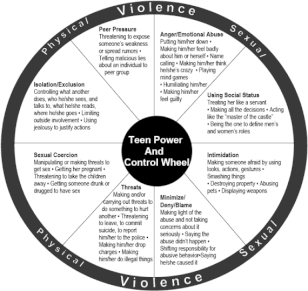
Hello Everyone!
February is Teen Dating Violence Awareness Month. Teen dating violence is a growing epidemic. Do you know a young adult, teenager, or tween? Did you know these startling statistics?
Among female victims of intimate partner violence, 94% of those age 16-19 and 70% of those age 20-24 were victimized by a current or former boyfriend or girlfriend. (1)
Nearly half (43%) of dating college women report experiencing violent and abusive dating behaviors. (2)
Only 33% of teens who were in a violent relationship ever told anyone about the abuse. (3)
Though 82% of parents feel confident that they could recognize the signs if their child was experiencing dating abuse, a majority of parents (58%) could not correctly identify all the warning signs of abuse. (4)
Our teens and young adults are being abused. It is known that victims of abuse are more prone to depression, anxiety, low self-esteem, trouble sleeping, eating problems, further domestic violence relationships, and many more problems.
What are some early warning signs that could help tell that your daughter or son might be in an abusive relationship?
Early warning signs include the following: Is their date jealous? Do they text constantly wanting to know about your son’s or daughter’s whereabouts? Abusers will isolate them from friends and family, be unpredictable in their mood, manipulate or make them feel guilty, and treat them with disrespect. These abusive traits can escalate to physical abuse.
What can we do about this? Talk about it. Be aware. Talk to both girls and boys about healthy relationships and dating abuse. Watch for early warning signs. Talk about respect—respecting oneself and other people.
Here are a few websites to visit to learn more about Teen Dating Violence:
www.loveisrespect.org
www.breakthecycle.org
www.teendvmonth.org
Let’s try to break the cycle of abuse by starting with our children.
Remember, if we can help just one person, we’ve done our job.
Katelin Maloney
Please note: If you are in an abusive relationship, please reach out to your local domestic violence organization or call the National Domestic Violence Hotline at 800-799-7233.
1) Callie Marie Rennison, Ph.D., Department of Justice, Bureau of Justice Statistics, “Intimate Partner Violence and Age of Victim, 1993-99” (2001). Available at: http://bjs.ojp.usdoj.gov/content/pub/pdf/ipva99.pdf
2) Fifth & Pacific Companies, Inc. (Formerly: Liz Claiborne, Inc.), Conducted by Knowledge Networks, (December 2010). “College Dating Violence and Abuse Poll,” Available at: https://www.breakthecycle.org/surveys.
3) Liz Claiborne Inc., conducted by Teenage Research Unlimited, (February 2005)
4) Fifth & Pacific Companies, Inc. (Liz Claiborne, Inc.), Conducted by Teen Research Unlimited, (May 2009). “Troubled Economy Linked to High Levels of Teen Dating Violence & Abuse Survey 2009,” Available at: https://www.breakthecycle.org/surveys.
February is Teen Dating Violence Awareness Month. Teen dating violence is a growing epidemic. Do you know a young adult, teenager, or tween? Did you know these startling statistics?
Among female victims of intimate partner violence, 94% of those age 16-19 and 70% of those age 20-24 were victimized by a current or former boyfriend or girlfriend. (1)
Nearly half (43%) of dating college women report experiencing violent and abusive dating behaviors. (2)
Only 33% of teens who were in a violent relationship ever told anyone about the abuse. (3)
Though 82% of parents feel confident that they could recognize the signs if their child was experiencing dating abuse, a majority of parents (58%) could not correctly identify all the warning signs of abuse. (4)
Our teens and young adults are being abused. It is known that victims of abuse are more prone to depression, anxiety, low self-esteem, trouble sleeping, eating problems, further domestic violence relationships, and many more problems.
What are some early warning signs that could help tell that your daughter or son might be in an abusive relationship?
Early warning signs include the following: Is their date jealous? Do they text constantly wanting to know about your son’s or daughter’s whereabouts? Abusers will isolate them from friends and family, be unpredictable in their mood, manipulate or make them feel guilty, and treat them with disrespect. These abusive traits can escalate to physical abuse.
What can we do about this? Talk about it. Be aware. Talk to both girls and boys about healthy relationships and dating abuse. Watch for early warning signs. Talk about respect—respecting oneself and other people.
Here are a few websites to visit to learn more about Teen Dating Violence:
www.loveisrespect.org
www.breakthecycle.org
www.teendvmonth.org
Let’s try to break the cycle of abuse by starting with our children.
Remember, if we can help just one person, we’ve done our job.
Katelin Maloney
Please note: If you are in an abusive relationship, please reach out to your local domestic violence organization or call the National Domestic Violence Hotline at 800-799-7233.
1) Callie Marie Rennison, Ph.D., Department of Justice, Bureau of Justice Statistics, “Intimate Partner Violence and Age of Victim, 1993-99” (2001). Available at: http://bjs.ojp.usdoj.gov/content/pub/pdf/ipva99.pdf
2) Fifth & Pacific Companies, Inc. (Formerly: Liz Claiborne, Inc.), Conducted by Knowledge Networks, (December 2010). “College Dating Violence and Abuse Poll,” Available at: https://www.breakthecycle.org/surveys.
3) Liz Claiborne Inc., conducted by Teenage Research Unlimited, (February 2005)
4) Fifth & Pacific Companies, Inc. (Liz Claiborne, Inc.), Conducted by Teen Research Unlimited, (May 2009). “Troubled Economy Linked to High Levels of Teen Dating Violence & Abuse Survey 2009,” Available at: https://www.breakthecycle.org/surveys.
 RSS Feed
RSS Feed